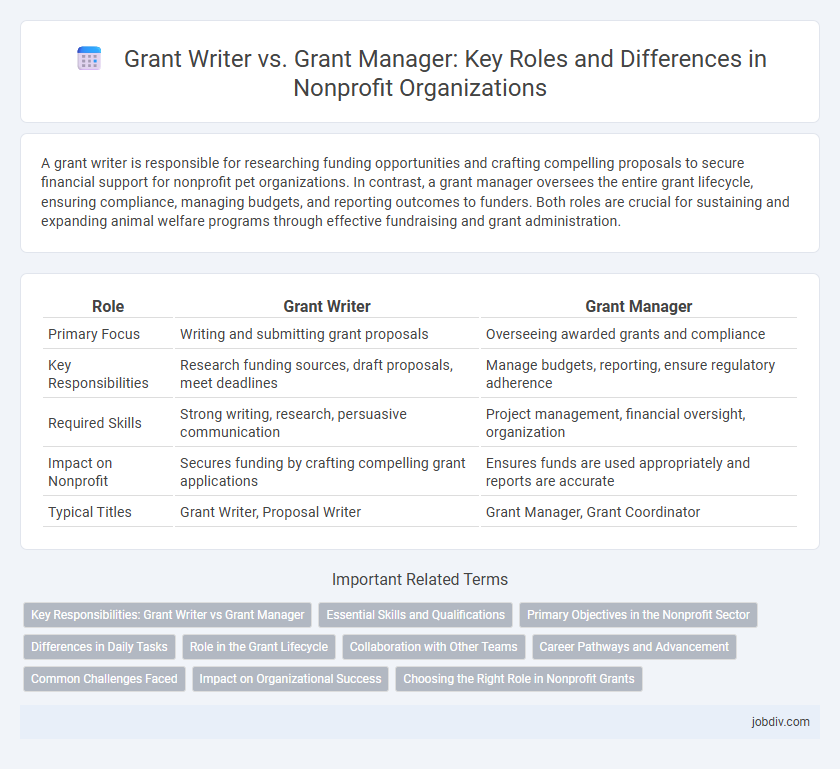A grant writer is responsible for researching funding opportunities and crafting compelling proposals to secure financial support for nonprofit pet organizations. In contrast, a grant manager oversees the entire grant lifecycle, ensuring compliance, managing budgets, and reporting outcomes to funders. Both roles are crucial for sustaining and expanding animal welfare programs through effective fundraising and grant administration.
Table of Comparison
| Role | Grant Writer | Grant Manager |
|---|---|---|
| Primary Focus | Writing and submitting grant proposals | Overseeing awarded grants and compliance |
| Key Responsibilities | Research funding sources, draft proposals, meet deadlines | Manage budgets, reporting, ensure regulatory adherence |
| Required Skills | Strong writing, research, persuasive communication | Project management, financial oversight, organization |
| Impact on Nonprofit | Secures funding by crafting compelling grant applications | Ensures funds are used appropriately and reports are accurate |
| Typical Titles | Grant Writer, Proposal Writer | Grant Manager, Grant Coordinator |
Key Responsibilities: Grant Writer vs Grant Manager
Grant writers focus on researching funding opportunities, drafting compelling proposals, and tailoring applications to meet specific grantor criteria. Grant managers oversee the entire grant lifecycle, including compliance monitoring, reporting, and coordinating stakeholder communication to ensure proper fund utilization. Both roles require strong organizational skills, but grant managers emphasize strategic planning and administrative oversight beyond proposal development.
Essential Skills and Qualifications
Grant writers excel in persuasive writing, research, and detail-oriented project proposal development, requiring strong communication and analytical skills to craft compelling narratives and meet funders' criteria. Grant managers possess project management expertise, budget oversight capabilities, and team coordination skills, ensuring successful implementation and compliance with grant requirements. Both roles benefit from knowledge of nonprofit regulations, fundraising strategies, and proficiency in grant management software.
Primary Objectives in the Nonprofit Sector
Grant writers in the nonprofit sector focus on crafting compelling proposals to secure funding, emphasizing clear articulation of program goals and measurable outcomes. Grant managers oversee the entire grants lifecycle, including compliance, reporting, and relationship management with funders to ensure accountability and sustained support. Both roles are critical but differ in their primary objectives: grant writers aim to acquire funding, while grant managers focus on stewardship and effective utilization of awarded grants.
Differences in Daily Tasks
Grant writers focus primarily on researching funding opportunities, crafting compelling proposals, and tailoring applications to meet specific grant criteria. Grant managers oversee the entire grant lifecycle, including compliance monitoring, budget tracking, and reporting to ensure grants are used according to donor requirements. While writers concentrate on securing funds, managers handle grant administration and relationship maintenance with funding agencies.
Role in the Grant Lifecycle
Grant writers specialize in crafting compelling proposals and securing funding by conducting thorough research, developing budgets, and tailoring applications to specific grant guidelines. Grant managers oversee the entire grant lifecycle, from application submission and award acceptance to compliance monitoring, reporting, and ensuring proper fund utilization. Effective nonprofit grant success relies on the collaboration between grant writers and grant managers to align strategic fundraising with operational accountability.
Collaboration with Other Teams
Grant Writers and Grant Managers play distinct yet complementary roles in nonprofit collaboration, with Grant Writers focusing on crafting compelling proposals and Grant Managers overseeing the strategic alignment and reporting processes. Effective collaboration involves Grant Writers working closely with program staff and finance teams to gather accurate data and project goals, while Grant Managers coordinate communication between development, compliance, and program departments to ensure grant requirements are met and deadlines adhered to. Leveraging strong teamwork improves grant success rates and fosters transparency across nonprofits.
Career Pathways and Advancement
Grant writers develop compelling proposals to secure funding, often starting as entry-level roles that build skills in research and persuasive writing. Grant managers oversee the entire grant lifecycle, including compliance and reporting, typically advancing from writing roles to leadership positions within nonprofit organizations. Career pathways emphasize growth from specialized writing expertise to strategic management responsibilities, enhancing opportunities for higher salary and organizational influence.
Common Challenges Faced
Grant writers often face challenges in thoroughly researching funding opportunities and crafting compelling, tailored proposals under tight deadlines, while grant managers frequently struggle with coordinating compliance requirements and tracking multiple grant budgets simultaneously. Both roles require meticulous attention to detail to avoid errors that could jeopardize funding. Effective communication between grant writers and managers is crucial to align proposal content with grant conditions and reporting obligations.
Impact on Organizational Success
Grant writers directly influence organizational success by securing crucial funding through persuasive proposals, increasing the nonprofit's capacity to implement programs. Grant managers enhance impact by overseeing grant compliance, reporting, and relationship building, ensuring sustained funding and donor trust. Together, they create a strategic synergy that maximizes resource acquisition and effective utilization, driving long-term organizational growth.
Choosing the Right Role in Nonprofit Grants
Grant writers specialize in researching funding opportunities and crafting compelling proposals that align with nonprofit goals, significantly increasing the chances of securing grants. Grant managers oversee the entire grant lifecycle, including compliance, reporting, budget management, and communication with funders, ensuring effective execution of funded projects. Selecting the right role depends on organizational needs: prioritize grant writers for proposal development and grant managers for strategic oversight and administrative responsibilities.
Grant Writer vs Grant Manager Infographic

 jobdiv.com
jobdiv.com